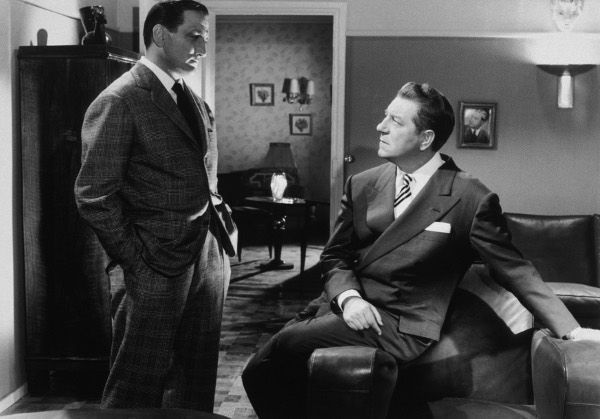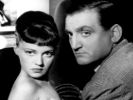Eye For Film >> Movies >> Touchez Pas Au Grisbi (1954) Film Review

One of the most striking things about the films of Jacques Becker is their quiet elegance. Known as a director who did not like to be rushed, the same measured feeling extends to his finished work, which glides along at a pace that befits whichever of the varied genres he was tackling at the time. This unhurried approach is particularly fitting for Touchez Pas Au Grisbi (Hands Off The Loot) - adapted from the novel by Albert Simonin - which despite its gangster credentials, deals extensively with the slowing up of middle age.
The loot of the title is almost incidental until deep into the film, acquired by Max (Jean Gabin, whose career received a second lease of life thanks to this) in an airport heist that we learn about only briefly. It's fitting, as Max is, aside from the usefulness of money, tired of such things, already planning a step back from the big time. What he cares about is his friends, in particular, Riton (René Dary), whose ("porcupine") head is still easily turned by a flutter of eyelashes and who doesn't see the march of time in the same way. "After midnight I always feel like I'm on overtime," grumbles Max as he tries to persuade Riton to leave the club where their latest squeezes Lola (Dora Doll) and Josy (Jeanne Moreau) are performing.

The club owner Pierrot (Paul Frankeur) - Fats to his friends - is another member of Max's coterie, but drug dealer Angelo (Lino Ventura, making his film debut) is from the younger generation, who are more interested in money than the gangsters' code and think nothing of moving in on another man's girl.
There will be plot developments involving kidnap, the loot as ransom and a gunfight but those are really just the burnt rubber on the road of what is, at heart, a character study and a dissection of friendship. Becker lets us see all of Max's haunts, Pierre Montazel's camera gliding through the rooms he walks into, drinking in the spaces and their atmosphere - from the restaurant where the film begins and ends, to his apartment with its getaway stairs. It is, perhaps, his other, secret, apartment that holds the key to Max's character. Used as a fallback position, it is almost clinical in its emptiness, but the fridge is fully stocked with the little pleasures of his life, including foie gras and champagne in, noticeably, half bottles - perfect for one or two. Not so much a hideout, then, as an escape from his other life.
Another key element used to illustrate Max's character is music, as he is seen at moments in the film putting his favourite record on, the camera watching the movement of jukeboxes cranking up, so that they command our attention in the same way they hold Max's. All the while, Gabin brings a weight of concern to Max. He's not crumpled so much as receding on the inside from his career, more attracted to a midnight snack than a bank heist. Becker's interest in the details fleshes out Max's life and retirement aspirations but also shows the seeds of doubt in other characters, such as when Riton, after his gentle mocking from his old friend, is seen inspecting himself in the bathroom mirror, as though for the first time.
In Becker's world, life-changing events can and do happen but it's the smaller gear shifts within the minds of his characters that have the greatest import and make the lasting impression.
Reviewed on: 25 Aug 2017

















